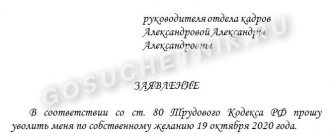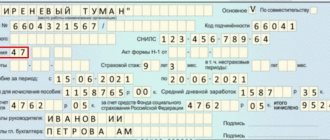Dismissal at the initiative of an employee is a strictly regulated procedure by the Labor Code of the Russian Federation. In standard situations, the initiator is obliged to notify senior management about the planned departure 14 days before the termination of the employment contract.
The deadline begins to count the day after the application is submitted and is given to the parties for good reason: during this time, the employer will be able to find a candidate for the vacated position, and the employee will be able to change his decision. However, in some situations, current legislation allows you to dismiss an employee on the day the application is submitted.
Labor Code and dismissal without work
The work itself occurs in two cases of dismissal:
- At your own request - 2 weeks (Article 80 of the Labor Code of the Russian Federation)
- For staff reduction – 2 months (Article 180 of the Labor Code of the Russian Federation)
However, the second option is usually not considered work-off; in addition, everything here depends entirely on the employer - he has the right to fire the employee earlier, paying compensation for time not worked.
As a rule, the employee is interested in how to resign before the expiration of the two weeks provided for in Art. 80 Labor Code of the Russian Federation. This is possible: for example, if an employee is on a probationary period, then he must notify the employer of dismissal only three days in advance (Article 71 of the Labor Code of the Russian Federation). However, there are other options.
Employee payments
The payments due to an employee upon dismissal with service are identical to those issued upon dismissal without service. Basic compensation consists of money paid for unused vacation. But provided that there is an unused part of it.
Certain categories of employees can expect to receive additional benefits upon dismissal.
Some companies pay extra money to pregnant women and pensioners. You can find out whether there are such payments or not by reading the collective agreement or this may be indicated in the employment contract.
Additional payments are received by employees who leave their previous place of work by agreement of the parties. To do this, you need to record in the document the exact amount of payments due to the employee.
Thus, you can resign at your own request in one day. But this requires certain circumstances provided for by law. If they are confirmed, the employer is obliged to dismiss the employee on the day the application is submitted.
Dismissal on one's own initiative
Articles 77, 78, 80 of the Labor Code of the Russian Federation give the employee the right to terminate the employment relationship on his initiative, having notified management of his decision 14 days in advance. These days are for warning and are actually working off. But the same Article 80 indicates the possibility of resigning without service if it is impossible to continue working due to current circumstances for a good reason.
In Art. 81 of the Labor Code of the Russian Federation lists cases when an employee may not work the required 2 weeks. These are cases such as:
- Inability to continue their work activity in connection with full-time enrollment in a university or educational institutions for bachelor's and master's degrees
- Employee retirement
- Violation by an employee of labor legislation, as well as local acts and provisions of labor and collective agreements
- Other cases
Other cases covered by labor legislation include:
- Moving to another area for work
- Sending the second spouse to work abroad
- Moving to a new place of residence or for medical reasons
- Caring for a sick family member, a disabled child or a child under 14 years of age
Pensioners and pregnant women, as well as mothers and adoptive parents with a child under 14 years of age, can resign without service.
If an employee has submitted an application for dismissal of his own free will, which implies working off, and insists on an earlier dismissal date, allegedly having the right to do so, this will be wrong. When he actually has the right not to work the required period for the reasons stated above, he is obliged to notify the employer about this in writing.
If an employee has legal grounds for early termination of an employment relationship, they must be indicated in the application and provided with copies of documents proving this (for example, a certificate of enrollment in an institute, a certificate of transfer of a spouse to another location for service). Otherwise, he may earn absenteeism and be fired under the relevant article.
Read your employment contract carefully - the reasons for leaving without working may be specified in the collective agreement or in the internal labor rules of the organization.
It must be said that the 2-week work period specified in Article 80 of the Labor Code of the Russian Federation is not a strict condition; the same article states that if the employer and employee are mutually interested in terminating further labor cooperation, then the management of the enterprise can fire him without work on the day the application is written or another agreed date.
What to do if the employer refuses to fire you without working off
If an employee has legal grounds for canceling the notice period, but the employer forces him to work, does not sign the application and does not issue an order, you can complain to the Labor Inspectorate online or in person. It is important to take into account that applications are considered there within 30 calendar days.
The person resigning here is in a more disadvantageous position: even if you submit an application to the secretary and ask to put a mark on the registration of the incoming document on the second copy, and then simply do not go to work, the employer may not issue a dismissal order. Consequently, pay slips and documents from the HR department will not be issued.
If there are no reasons for terminating the contract without observing the notice period, and the employer insists on working off, you will have to go for another two weeks. But there is no point in complaining to the labor inspectorate - the law is on the manager’s side.
Note: if an employer deprives a resigning employee of the opportunity to work elsewhere without issuing a work book, he may be held liable under Art. 234 Labor Code of the Russian Federation. You will have to reimburse the employee for any unearned wages. Administrative liability may also arise under Art. 5.27 Code of Administrative Offenses of the Russian Federation. For example, if upon retirement you are forced to work 14 days, or your salary is delayed upon final payment.
Dismissal without working for two weeks
An employee can resign without working the mandatory two weeks within a 3-day period. This is possible when the following circumstances occur:
- During the probationary period - Art. 71 Labor Code of the Russian Federation
- If the employment contract was concluded for a period of less than 2 months - Art. 292 Labor Code of the Russian Federation
- If the employee was engaged in seasonal work - Art. 296 Labor Code of the Russian Federation. This period is provided only for the employee. If an employer decides to dismiss a seasonal employee, he must notify the latter 7 calendar days in advance
In order for an employee to be considered a seasonal worker, this must be specified in the employment contract.
Registration of a work book
Based on Government Decree No. 225 of April 16, 2003, an entry in the work book upon termination of the contract is made on the basis of the Order for the dismissal of the employee. Resolution of the Ministry of Labor No. 69 of October 10, 2003 clearly states the procedure for filling out the Work Information section:
| Count | Filling rules |
| 1 | The serial number of the record is written down |
| 2 | The date of the last mark is indicated in the format DD MM YYYY |
| 3 | The basis for termination of the contract is prescribed with reference to the relevant article of the Labor Code of the Russian Federation |
| 4 | Enter the name of the order and the date of its preparation |
The wording of the text written in Column 3 may look like this: “ The employment contract was terminated at the initiative of the employee, paragraph 3, article 77 of the Labor Code of the Russian Federation. ”
Important
All entries in the employee’s work book must be certified by the signature of an authorized person and the seal of the organization. After reading the last entry, the employee also signs and writes down its transcript.
Application for dismissal without work
In order to resign, an employee must write a statement addressed to the employer. Exactly the same procedure applies if an employee quits without working. The application should indicate “I ask you to dismiss me without obligatory 2-week work for the reason....”
In some cases, the employee must provide evidence that he cannot work the required 2 weeks. For example, if this is not possible due to moving to another place of residence. To do this, it is enough to present documents about the discharge.
Is it possible to resign of your own free will if you are on vacation?
Russian legislation does not prohibit writing and submitting a letter of resignation, even while on vacation. In addition, you can submit your resignation letter and go on vacation for 14 days after management has reviewed and signed it. And you won’t have to stay at work for another 2 weeks after returning from vacation.
An employee can resign at his own request even during vacation
Vacation followed by dismissal
Another option to resign without having to work off work is to write a statement asking for vacation days not taken off and to terminate the employment relationship immediately after. The date of dismissal, that is, the final working day, will be the day the vacation ends. On the same day, the employee must receive the due cash payments and work book.
The duration of vacation in this case should be no shorter than 14 days. However, management reserves the right to grant leave followed by dismissal to the employee or not. For an employee, when filling out an application for such leave, it would be correct to indicate in the text: “I ask you to provide leave from such and such to such and such a date with subsequent dismissal.” The day the vacation ends is stated in the application so that in the future there will be no disagreements or disputes regarding the day of dismissal.
If the employee wrote a letter of resignation on his own initiative, began to work for the required 14 days and issued a certificate of incapacity for work during this period, accordingly he will be on sick leave, actually avoiding work. In this case, he will be dismissed in absentia on the day specified in the application with mandatory payment of this sick leave.
Final payment upon dismissal
Receive wages and benefits for unused vacation. On the last day of work of a subordinate, the employer is obliged to pay the employee:
- monetary remuneration for worked and previously unpaid working days;
- other payments provided for in the employment contract, for example, a bonus;
- vacation pay - compensation for unused vacation.
An employee can go on vacation at the expense of the company six months after joining the staff. If an employee took a vacation at his own expense after 6 months of work in the organization and did not have time to take advantage of the right to “free vacations,” he can claim them or compensation for their cost - vacation pay upon dismissal.
An employee will be able to receive bonuses, allowances and remuneration for additional work on the last (calculated) working day at the enterprise.
Additional payments are called severance pay. They can be paid if:
- liquidation of an enterprise and forced dismissal of an employee;
- staff reduction;
- refusal of an employee to work at the enterprise due to changes in working conditions or job responsibilities;
- conscription of an employee into the army;
- inability to work due to health reasons.
The minimum amount of severance pay is two weeks' wages. The maximum is a two- or three-month rate (official salary). Additional payments are not due to an employee who decides to leave the organization voluntarily.
Upon dismissal, the organization must pay the employee in full, so in addition to salary, he will receive the due bonus and compensation for unused vacation
Does the employer have the right to withhold an advance paid towards vacation?
Vacation pay is paid 3 days before the start of the vacation - this is what the law says. If the employee received the money and decided to resign on the same day of his own free will, the employer can withhold vacation pay paid in advance from his salary.
If the amount of paid vacation pay is greater than the amount of withholding, the employer has the right to:
- Ask the employee to reimburse the amount of “extra” vacation pay voluntarily.
- Refuse the refund and forget about the amount paid.
- Go to court with a demand to recover the amount of vacation pay from the former employee.
The employer cannot force a former employee to return the overpaid amount to the organization's cash desk and in no case can blackmail or threaten all kinds of punishments for refusal.
The labor inspectorate usually acts in the interests of the employee and rarely goes over to the side of the employer, even if he behaves lawfully, unlike his former subordinate. However, the director of the enterprise also has rights, for example, the right to compensation for losses that he incurred when paying an advance for unused vacation. How the court will behave in this situation is unknown. But it is obvious that the best way is to resolve the conflict between employer and subordinate before litigation.
Since the court most often takes the citizen’s side, a competent employer will not extort an advance payment for vacation from a former employee
One day dismissal without work
Another way not to work out is to ask for dismissal with the agreement of the parties (Article 78 of the Labor Code of the Russian Federation), when it occurs on the specified date.
It is necessary to correctly draw up the application itself in this case. Writing “Please fire me on such and such a date” is incorrect, since it turns out that this is a dismissal at the initiative of the employee, and therefore implies legal service.
It would be correct to indicate: “I request dismissal by agreement of the parties (Clause 1, Article 77 of the Labor Code of the Russian Federation). Or submit not an application, but a proposal to terminate the employment relationship on the same basis from such and such a date with a request to provide a written response to this proposal by such and such a date.
A written response is required in case of disagreement. The notorious 14-day notice period for dismissal is used for a reason. After all, it is necessary to find a replacement for the departing employee and carry out the transfer of affairs and all settlements with him.
If the employer does not believe that the circumstance that has occurred is grounds for dismissing the employee in one day, the latter can apply to the labor commission or to court to protect his rights.
Types of working holidays
Vacation is the legal release of an employee from performing his job duties for a certain period of time while retaining his position and salary.
The right to such rest is enshrined in the Constitution of the Russian Federation, the Labor Code of the Russian Federation and other legislative acts. An application for dismissal while on leave without work can be submitted if the employee is on one of the following types of working holidays:
- annual leave provided to everyone who works under a contract;
- maternity leave;
- social (educational, without salary, for pregnancy and childbirth).
A resignation letter written before the vacation or during the period while the employee is on vacation will be grounds for replacing work with vacation days.
If the resignation letter is written on March 3, and vacation is provided from 4 to 17, then you do not need to work out anything. On March 18, such an employee will be considered dismissed. Time is calculated according to the same principle if the application is written during vacation: the remainder of the rest days will be counted as work, starting from the day following the writing of the application. Other days will need to be worked in the general order.
Indirect reasons for urgent dismissal
The basis for urgent dismissal can be one of the following reasons:
- in connection with moving for permanent residence in another region due to circumstances beyond his control that require an urgent move;
- a long business trip of the husband (wife) to another region or country, due to which the whole family moves along with the seconded spouse;
- poor health, which does not allow you to perform assigned work or live in this region due to poor ecology. To confirm the fact, the employee must present a health certificate issued by a competent medical commission. The conclusion should include recommendations to stop working at this enterprise or change your place of residence to another, more health-friendly region;
- if there is a child under 14 years of age, and/or pregnancy. When a woman is pregnant, she does not have to wait for maternity leave. If working conditions provoke a threat to bearing a child, she can quit at any time without any work. She may also quit in order to pay more attention to raising minor children;
- the employee is one of the parents of a large family, where children under the age of 16 or 18 are students;
- the need to care for a family member who is disabled in group 1 or is seriously ill and needs constant care (a medical report is required).
Basic information
The Labor Code of the Russian Federation does not contain the term “working off”. There is only a rule according to which a subordinate must inform the employer of his desire to resign 2 weeks before the planned date of departure. He will need to work for the next 14 days, and the period begins not from the moment the authorized person signs the application, but from the next day. Only calendar days are taken into account.
The subordinate draws up a statement, indicating in it his desire to resign without working off. The document will need to reflect the following information:
- position and full name of the person who accepts the application;
- employer name;
- Full name of the subordinate indicating the structural unit;
- request of the subordinate to formalize his dismissal on the specified date without working off;
- an indication of the presence of compelling circumstances that prevent compulsory service;
- list of attached evidentiary documents;
- date of writing the application, signature of the subordinate and its transcript.
The application is drawn up on a special form of the enterprise, and in its absence - on a regular sheet.
Is it necessary to work out violations on the part of the company?
You can leave without working if the employer violated the norms of labor legislation, local regulations, the terms of a collective agreement, agreement or employment contract in relation to the employee. In this case, it is important that the violation is established by an authorized body (court, trade union or labor inspectorate). In the absence of a trade union, it is easier to deal with the labor inspectorate, which acts at the request of the employee. At the same time, she either requests the necessary documents from the employer or comes to the office to check. Having found violations, the inspection will issue an order to eliminate them. If this is not done within the prescribed period, the company will be punished by law. After discovering violations, you get the opportunity to resign without working off. It is better to file a lawsuit with a lawyer, whose services will subsequently be paid by the losing party.







